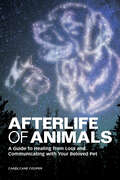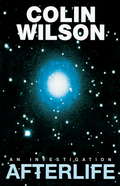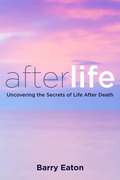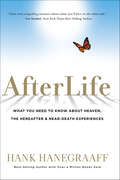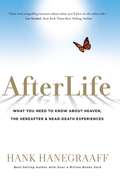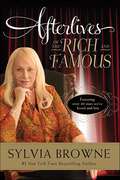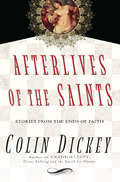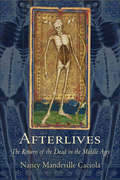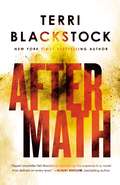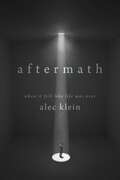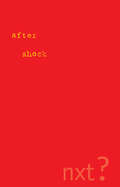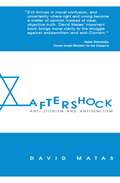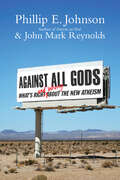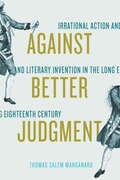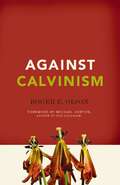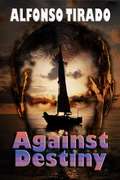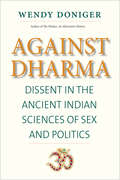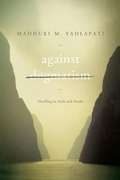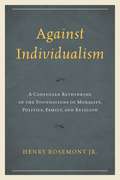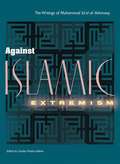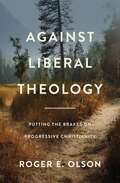- Table View
- List View
Afterlife of Animals: A Guide to Healing from Loss and Communicating with Your Beloved Pet
by Candi Cane CooperConnect with and honor your animal companion with this gentle guide to the other side Losing a pet can be one of the hardest things you'll deal with. Although your companion may be physically gone, their presence is still with you every day. This exploration of pets and the afterlife is your resource for compassionate grieving and building a connection to your beloved pet even after they've crossed the Rainbow Bridge. Find tools to help you process the complex emotions of your loss and understand that however you're feeling is normal. Learn to read and interpret the different ways that your pet might be communicating with you from beyond, and find advice on how you can reach out to and honor their spirit and presence every day. Get help grieving the loss of a pet with guidance that includes: Animals of every shape and size—No matter what kind of companion you're missing, there's advice, healing, and guidance for you. Afterlife remembrance—Learn tactics that can help you value and cherish your sweet animal with little daily rituals. Rainbow Bridge FAQs—Find answers to all sorts of questions about what happens to our pets once they move on. Find comfort from your wonderful pet even after they've passed on.
Afterlife: A History Of Life After Death
by Philip C. AlmondFor in that sleep of death what dreams may come? The end of life has never meant the extinction of hope. People perpetually have yearned for, and often been terrified by, continuance beyond the horizon of mortality. Ranging across time and space, Philip Almond here takes his readers on a remarkable journey to worlds both of torment and delight. He travels to the banks of the Styx, where Charon the grizzled boatman ferries a departing spirit across the river only if a gold obol is first placed for payment on the tongue of its corpse. He transports us to the legendary Isles of the Blessed, walks the hallowed ground of the Elysian Fields and plumbs the murky depths of Tartarus, primordial dungeon of the Titans. The pitiable souls of the damned are seen to clog the soot-filled caverns of Lucifer even as the elect ascend to Paradise. Including medieval fears for the fate of those consumed by cannibals, early modern ideas about the Last Day and modern scientific explorations of the domains of the dead, this first full treatment of the afterlife in Western thought evokes many rich imaginings of Heaven, Hell, Purgatory and Limb
Afterlife: An Investigation
by Colin WilsonThis extraordinary volume addresses the compelling possibility of life after death. Afterlife is the only encyclopedic overview by a dispassionate observer currently available. Fascinating reading for believers and non-believers alike.
Afterlife: Uncovering the Secrets of Life After Death
by Barry EatonFor the thousands of people who loved To Heaven and Back, Heaven is for Real, and Proof of Heaven, a warm and detailed account of life between lives-and our lives to come What happens when someone dies? What does it feel like? What exactly is the light at the end of the tunnel? Is reincarnation real? And if so, do spirits have any influence over their lives to come? Based on his own amazing experiences communicating with those who have passed over, Barry Eaton answers these questions about the spirit world, and many, many more. Taking the reader on a journey through the realm of the spirit, the author details the whole process of crossing into the next life, from the journey "home,” to adapting to new living conditions in the afterlife, and even delving into what kinds of activities will be available there, and how we can be prepared for our own personal journey. This book will give hope, alleviate fear, and provide comfort for anyone who has questions or concerns about life after death. .
Afterlife: What You Need to Know about Heaven, the Hereafter & Near-Death Experiences
by Hank HanegraaffIf there was ever a need-to-know book, Afterlife is it. On his daily call-in radio show, the most common questions Hanegraff fields are about the hereafter. For instance, millions are voraciously reading about the near-death experiences of young children. Consumers are desperate for knowledge and reassurance about what comes after life on the earth. Hank Hanegraff, one of the most remarkable theological minds of the 21st century, explains the marvelous way this physical life connects our past to our eternal future. Afterlife gives reader a clear and concrete understanding about what happens after death to us and to those we love.
Afterlife: What You Really Want to Know About Heaven, the Hereafter, & Near-Death Experiences
by Hank Hanegraaff[Back Cover]: "New York Times bestsellers on near-death experiences depict--A 3-year-old who meets Jesus and his rainbow-colored horse; A neurosurgeon encountering Om and the Orb on the wing of a butterfly; [and] A real estate broker descending to earth's center to discover hell is 300 degrees and zero humidity. Do such exotic experiences provide trustworthy information about the afterlife? If not, how can we know what happens beyond death's door? In AfterLife, Hank Hanegraaff, one of the most remarkable theological minds of our time, explains how life in the present intersects with life after life and ultimately life after life after life. With laser-sharp clarity this surprisingly insightful book demonstrates that death is not the end--in fact, it's just the beginning. AfterLife will forever change the way you view your eternal destiny!"
Afterlives of the Rich and Famous
by Sylvia Browne“I have known Sylvia for twenty years, and I have the greatest respect for her….I applaud her for the peace and solace that she has brought to so many.” —Montel WilliamsThe world’s most acclaimed psychic, Sylvia Browne, the New York Times bestselling author of Life on the Other Side, All Pets Go to Heaven, Contacting Your Spirit Guide, and more, returns with a rare and riveting look at the lives of some of our favorite celebrities—after their deaths. How do Elvis Presley, Heath Ledger, John Lennon, and others view their time on Earth? After they have shuffled off this mortal coil, what wisdom do they wish to send back to us? Sylvia Browne’s moving look at these once larger-than-life heroes is a captivating voyage into the secrets they hold beyond the void.
Afterlives of the Saints
by Colin DickeyAfterlives of the Saints is a woven gathering of groundbreaking essays that move through Renaissance anatomy and the Sistine Chapel, Borges' "Library of Babel," the history of spontaneous human combustion, the dangers of masturbation, the pleasures of castration, "and so forth" - each essay focusing on the story of a particular (and particularly strange) saint.
Afterlives of the Saints
by Colin DickeyAfterlives of the Saints is a woven gathering of groundbreaking essays that move through Renaissance anatomy and the Sistine Chapel, Borges' "Library of Babel," the history of spontaneous human combustion, the dangers of masturbation, the pleasures of castration, "and so forth" - each essay focusing on the story of a particular (and particularly strange) saint.
Afterlives: The Return of the Dead in the Middle Ages
by Nancy Mandeville CaciolaSimultaneously real and unreal, the dead are people, yet they are not. The society of medieval Europe developed a rich set of imaginative traditions about death and the afterlife, using the dead as a point of entry for thinking about the self, regeneration, and loss. These macabre preoccupations are evident in the widespread popularity of stories about the returned dead, who interacted with the living both as disembodied spirits and as living corpses or revenants. In Afterlives, Nancy Mandeville Caciola explores this extraordinary phenomenon of the living's relationship with the dead in Europe during the five hundred years after the year 1000.Caciola considers both Christian and pagan beliefs, showing how certain traditions survived and evolved over time, and how attitudes both diverged and overlapped through different contexts and social strata. As she shows, the intersection of Christian eschatology with various pagan afterlife imaginings—from the classical paganisms of the Mediterranean to the Germanic, Celtic, Slavic, and Scandinavian paganisms indigenous to northern Europe—brought new cultural values about the dead into the Christian fold as Christianity spread across Europe. Indeed, the Church proved surprisingly open to these influences, absorbing new images of death and afterlife in unpredictable fashion. Over time, however, the persistence of regional cultures and beliefs would be counterbalanced by the effects of an increasingly centralized Church hierarchy. Through it all, one thing remained constant: the deep desire in medieval people to bring together the living and the dead into a single community enduring across the generations.
Aftermath
by Terri BlackstockThis gripping new thriller will leave you on the edge of your seat.A devastating explosion.Three best friends are at the venue to hear their favorite band. Only one makes it out alive.A trunk full of evidence.When police stop Dustin Webb with a warrant to search his trunk, he knows there&’s been a mistake. He&’s former military and owns a security firm. But he&’s horrified when the officers find explosives, and he can&’t fathom how they got there.An attorney who will risk it all for an old friend.Criminal attorney Jamie Powell was Dustin&’s best friend growing up. They haven&’t spoken since he left for basic training, but she&’s the first person he thinks of when he&’s arrested. Jamie knows she&’s putting her career on the line by defending an accused terrorist, but she&’d never abandon him. Someone is framing Dustin to take the fall for shocking acts of violence . . . but why?Praise for Aftermath:&“In Aftermath, Terri Blackstock plumbs the depth of human emotion in the face of devastating tragedy, grief, and loss. Yet, she still manages to give readers her trademark suspenseful story, sweet romance, and hope for the future. From gut-wrenching scenes in a cancer patient&’s hospital room to seeing the world through the eyes of a young woman with a debilitating mental health disorder, Blackstock pulls no punches about human frailties. Does the end justify the means? Romantic suspense lovers won&’t want to miss Aftermath.&” —Kelly Irvin, bestselling author&“Justice may be blind but that doesn&’t keep it from facing mortal danger. In Aftermath, expert storyteller Terri Blackstock ratchets up the suspense in a novel that delivers on every level. Conflicts rage and loyalties are tested to the ultimate limit. Set aside plenty of time when you pick up this book—you&’ll not want to take a break.&” —Robert Whitlow, bestselling authorStand-alone suspenseBook length: 72,000 wordsIncludes discussion questions for book clubsAlso by Terri Blackstock: If I Run, If I&’m Found, If I Live, Smoke Screen, Cape Refuge, and Truth-Stained Lies
Aftermath: When It Felt Like Life Was Over
by Alec KleinFor years, Alec Klein investigated cases where people faced the nightmare of wrongful accusations. Suddenly, he found himself on the other side, falsely accused himself.For years, Alec Klein investigated cases where people faced the nightmare of wrongful accusations. Suddenly, he found himself on the other side, falsely accused himself. In a coordinated media attack, he was accused of misconduct as a professor at a top U.S. university, and in a rush to judgment, before he had a chance to defend himself, his life was destroyed. What happens when you have little hope? In the aftermath, Alec gravitated to the unlikeliest of places, among the unlikeliest of people, doing the unlikeliest of things. This is a first-person true story about faith, forgiveness and redemption.
Aftershock
by Adrian HollowayDaniel was the sole survivor of a road accident that propelled three young people into the afterlife. Now he's back, and ready to convince his friends and family that Jesus is their only hope before they face judgement after death. Profoundly changed by his experience, he's nevertheless shocked to discover that other people can't share his certainty. In writing the story of Daniel and his friends, as they wrestle with the arguments for and against Christian belief, Adrian Holloway has given readers and youth leaders a unique weapon in their spiritual armoury. There really is nothing quite like this.
Aftershock: Anti-Zionism & Anti-Semitism
by David MatasVerbal attacks against Israel for human rights violations have turned into physical attacks against the Jewish community worldwide. How has that happened? This book attempts to explain the phenomenon. Anti-Zionists, whose primary goal is destruction of the State of Israel, use accusations of the worst forms of human rights violations against Israel to delegitimize the state. These accusations criminalize the Jewish population worldwide for actual or presumed support of the State of Israel. The contemporary international human rights system and the existence of the State of Israel are twin legacies of the Holocaust. The failure of the human rights system to prevent attacks on Israel and the Jews is an aftershock of the Holocaust.
Against All Gods: What's Right and Wrong About the New Atheism
by Phillip E. Johnson John Mark ReynoldsThe father of the intelligent design movement, Phillip Johnson, thinks the new atheists are right! How? They've put serious discussion about God back on the public agenda. Despite their conclusions, folks like Richard Dawkins, Sam Harris and Daniel Dennett are asking the right questions. They're making belief in any religion an issue again, especially in the university context where, for decades, questions about faith and reason have been taken off the table for serious discussion. Open debate is exactly what we need on the topics of God, evolution and creation. Together Johnson and John Mark Reynolds help us see the unique opportunity these vociferous and even evangelistic atheists are creating in their attempt to convert us to their unbelief. The authors show that we need not fear or react against these challenges. Rather they point to better ways to engage the opinions of this new, aggressive form of antireligious activity. With skill and insight they energetically take on the question of whether the evidence leads to a materialistic naturalism or points toward a creator God. Be informed. Be encouraged. Join the discussion.
Against All Odds: The Struggle for Racial Integration in Religious Organizations
by Brad Christerson Michael Oluf Emerson Korie Little EdwardsReligious institutions are among the most segregated organizations in American society. This segregation has long been a troubling issue among scholars and religious leaders alike. Despite attempts to address this racial divide, integrated churches are very difficult to maintain over time. Why is this so? How can organizations incorporate separate racial, ethnic, and cultural groups? Should they? And what are the costs and rewards for people and groups in such organizations? Following up on Michael O. Emerson and Christian Smith's award-winning Divided by Faith, Against All Odds breaks new ground by exploring the beliefs, practices, and structures which allow integrated religious organizations to survive and thrive despite their difficulties. Based on six in-depth ethnographies of churches and other Christian organizations, this engaging work draws on numerous interviews, so that readers can hear first-hand the joys and frustrations which arise from actually experiencing racial integration. The book gives an inside, visceral sense of what it is like to be part of a multiracial religious organization as well as a theoretical understanding of these experiences.
Against Apion
by Flavius JosephusJosephus, soldier, statesman, historian, was a Jew born at Jerusalem about 37 CE. A man of high descent, he early became learned in Jewish law and Greek literature and was a Pharisee. After pleading in Rome the cause of some Jewish priests he returned to Jerusalem and in 66 tried to prevent revolt against Rome, managing for the Jews the affairs of Galilee. In the troubles which followed he made his peace with Vespasian. Present at the siege of Jerusalem by Titus, he received favours from these two as emperors and from Domitian and assumed their family name Flavius. He died after 97. As a historical source Josephus is invaluable. His major works are: History of the Jewish War, in seven books, from 170 BCE to his own time, first written in Aramaic but translated by himself into the Greek we now have; and Jewish Antiquities, in twenty books, from the creation of the world to 66 CE. The Loeb Classical Library edition of the works of Josephus also includes the autobiographical Life and his treatise Against Apion.
Against Better Judgment: Irrational Action and Literary Invention in the Long Eighteenth Century
by Thomas Salem ManganaroRobinson Crusoe recognizes it is foolish to leave for the open seas; nevertheless, he boards the ship. William Wordsworth of The Prelude sees the immense poetic task ahead of him, but instead of beginning work, he procrastinates by going for a walk. Centering on this sort of intentionally irrational action, originally defined as " akrasia" by the ancient Greeks and "weakness of will" in early Christian thought, Against Better Judgment argues that the phenomenon takes on renewed importance in the long eighteenth century.In treating human minds and bodies as systems and machines, Enlightenment philosophers did not account for actions that may be undermotivated, contradictory, or self-betraying. A number of authors, from Daniel Defoe and Samuel Johnson to Jane Austen and John Keats, however, took up the phenomenon in inventive ways. Thomas Manganaro traces how English novelists, essayists, and poets of the period sought to represent akrasia in ways philosophy cannot, leading them to develop techniques and ideas distinctive to literary writing, including new uses of irony, interpretation, and contradiction. In attempting to give shape to the ways people knowingly and freely fail themselves, these authors produced a new linguistic toolkit that distinguishes literature’s epistemological advantages when it comes to writing about people.
Against Calvinism: Rescuing God's Reputation from Radical Reformed Theology
by Roger E. OlsonCalvinist theology has been debated and promoted for centuries. But is it a theology that should last? Roger Olson suggests that Calvinism, also commonly known as Reformed theology, holds an unwarranted place in our list of accepted theologies. In Against Calvinism, readers will find scholarly arguments explaining why Calvinist theology is incorrect and how it affects God’s reputation. Olson draws on a variety of sources, including Scripture, reason, tradition, and experience, to support his critique of Calvinism and the more historically rich, biblically faithful alternative theologies he proposes. Addressing what many evangelical Christians are concerned about today—so-called “new Calvinism,” a movement embraced by a generation labeled as “young, restless, Reformed” —Against Calvinism is the only book of its kind to offer objections from a non-Calvinist perspective to the current wave of Calvinism among Christian youth. As a companion to Michael Horton’s For Calvinism, readers will be able to compare contrasting perspectives and form their own opinions on the merits and weaknesses of Calvinism.
Against Destiny: Life does not end with death.
by Alfonso TiradoAntonio Carrales, coming back after having visited Doña Leonor, his mother (in the novel La Dama del Silencio, from the same author), in Mexico City, with a deep pain in his soul by the sad omen that he will never see her again, returns to his life in New York City. The story tells part of the life of Antonio, historical researcher, navigator of dreams and a passionate writer, and in parallel, it’s the story of the adventures of an ambitious Spaniard, traveling to San Francisco, attracted by the discovery of the gold deposits in the 1850's. The route to get to San Francisco on the Atlantic side was crossing through Nicaragua. As soon as he disembarks, Diego Ruelas, amazed by the tropical exuberance, changes his plans, stays in Nicaragua and in a short time falls in love, head over heels with a beautiful native girl. They live in the years of tyranny by the freebooter William Walker. His wife and their son disappear when the slave hunt is unleashed. Diego Ruelas, after a tireless search for his family, gives up and totally beaten decides to return to Spain. During the voyage back, the ship is struck by a storm and he dies. Antonio Carrales sinks into the abyss of disappointed love and decides to take a long trip on his sail boat. He is caught by a storm and the ship is destroyed. When he wakes up he doesn’t remember anything about where or who he is. They rescue him, but because of his attitude towards the Coast Guard, they wonder if he has suffered any brain damage that causes him amnesia, and it gets worse, when they discover that he pretends to be someone else, someone who doesn’t correspond to the papers that identify him as Antonio Carrales and he insists on calling himself Diego Ruelas. The case is assigned by the hospital to a doctor in psychology. Things get even more complicated when she falls in love with her patient during the process of clarifying his identity. They manage, with the intervention of a hypnotist and researcher
Against Dharma: Dissent in the Ancient Indian Sciences of Sex and Politics (The Terry Lectures Series)
by Wendy DonigerAn esteemed scholar of Hinduism presents a groundbreaking interpretation of ancient Indian texts and their historic influence on subversive resistance Ancient Hindu texts speak of the three aims of human life: dharma,artha, and kama. Translated, these might be called religion, politics, and pleasure, and each is held to be an essential requirement of a full life. Balance among the three is a goal not always met, however, and dharma has historically taken precedence over the other two qualities in Hindu life. Here, historian of religions Wendy Doniger offers a spirited and close reading of ancient Indian writings, unpacking a long but unrecognized history of opposition against dharma. Doniger argues that scientific disciplines (shastras) have offered lively and continuous criticism of dharma, or religion, over many centuries. She chronicles the tradition of veiled subversion, uncovers connections to key moments of resistance and voices of dissent throughout Indian history, and offers insights into the Indian theocracy’s subversion of science by religion today.
Against Dogmatism: Dwelling in Faith and Doubt
by Madhuri M. YadlapatiMany contemporary discussions of religion take an absolute, intractable approach to belief and non-belief, which privileges faith and dogmatism while treating doubt as a threat to religious values. As Madhuri M. Yadlapati demonstrates, however, there is another way: a faith (or non-faith) that embraces doubt and its potential for exploring both the depths and heights of spiritual reflection and speculation. Through three distinct discussions of faith, doubt, and hope, Yadlapati explores what it means to live creatively and responsibly in the everyday world as limited, imaginative, and questioning creatures. She begins with a perceptive survey of diverse faith experiences in Islam, Buddhism, Judaism, Hinduism, and Protestant Christianity, then narrows her focus to Protestant Christianity and Hinduism to explore how the great thinkers of those faiths have embraced doubt in the service of spiritual transcendence. Defending the rich tapestry of faith and doubt against polarization, Against Dogmatism reveals a spiritual middle way, an approach native to the long-standing traditions in which faith and doubt are interwoven in constructive and dynamic ways.
Against Individualism: A Confucian Rethinking of the Foundations of Morality, Politics, Family, and Religion
by Henry RosemontThe first part of Against Individualism: A Confucian Rethinking of the Foundations of Morality, Politics, Family, and Religion is devoted to showing how and why the vision of human beings as free, independent and autonomous individuals is and always was a mirage that has served liberatory functions in the past, but has now become pernicious for even thinking clearly about, much less achieving social and economic justice, maintaining democracy, or addressing the manifold environmental and other problems facing the world today. In the second and larger part of the book Rosemont proffers a different vision of being human gleaned from the texts of classical Confucianism, namely, that we are first and foremost interrelated and thus interdependent persons whose uniqueness lies in the multiplicity of roles we each live throughout our lives. This leads to an ethics based on those mutual roles in sharp contrast to individualist moralities, but which nevertheless reflect the facts of our everyday lives very well. The book concludes by exploring briefly a number of implications of this vision for thinking differently about politics, family life, justice, and the development of a human-centered authentic religiousness. This book will be of value to all students and scholars of philosophy, political theory, and Religious, Chinese, and Family Studies, as well as everyone interested in the intersection of morality with their everyday and public lives.
Against Islamic Extremism: The Writings Of Muhammad Sa'id Al-'ashmawy
by Carolyn Fluehr-LobbanOne of the Islamic world's leading voices in the struggle against extremism, Sa'id al-'Ashmawy was trained as a specialist in Islamic law and comparative law at Cairo University and served as judge, chief prosecutor, chief justice of the High Criminal Court, chief justice of the High Court for Security of State as well as chief justice of the High Court Assizes in Egypt. The author of 15 books on Islam and the law, he has been consistently critical of Islamic extremism and opposes the very notion of an Islamic state, on both scriptural and historical grounds. <p><p> Facing death threats for apostasy since 1979 and under continuous government protection since 1980, he articulates an opposition to the ideology and practice of Islamic extremists in Egypt that has applicability throughout the Middle East and North Africa. This volume conveys the range of his reformist message from the similarities of Islam, Judaism, and Christianity, to the dangers of politicizing Islamic religion, to the place of Islamic law in contemporary politics and society.
Against Liberal Theology: Putting the Brakes on Progressive Christianity
by Roger E. OlsonLiberal Christian theology is a big topic in today's churches and seminaries. But what does liberal theology really mean and why is it so controversial? What does it actually believe about truth, Scripture, and Jesus Christ? And where does it lead?The term "liberal theology" is often misinterpreted, confused with a set of loose ideologies within the Christian faith and sometimes rallied behind by genuine Christians who are simply concerned about modern social justice issues. It's also been wrongly leveled against churches and even entire denominations that don't adhere to the tradition of liberal theology.Against Liberal Theology, is written in a direct and conversational tone that makes sense of this theological movement by:Defining liberal theology and explaining its beliefs about central Christian doctrines.Giving its history and progression—beginning with 18th century German theologian Friedrich Schleiermacher and leading up to today.Making distinctions between liberal theology and simple moderate or progressive Christian thought, much of which is still biblically committed and doctrinally orthodox.Discussing the arguments of specific liberal theologians and what their words mean in regard to everyday Christian living and faith.Sincere and to the point, professor and theologian Roger E. Olson is not interested in grinding axes. He openly admits to frustration with fundamentalist Christianity and explains why. But he warns that true liberal theology—more concerned with making Christianity palatable to the modern mind than it is committed to biblical integrity—isn't the right alternative to the cultic tendencies of fundamentalism and has little in common with classical, biblical Christianity.Against Liberal Theology is perfect for Christians on any side of a cultural debate—for those who consider themselves progressive or conservative or something in between.It's always unpopular to be against anything. But in order for Christianity to be anything, it has to stand against some things. If Christianity is compatible with anything and everything, it is nothing.
